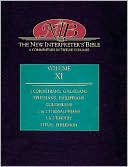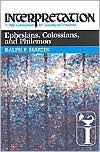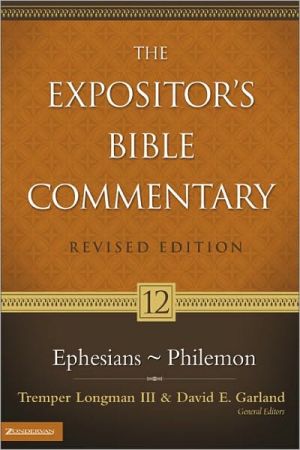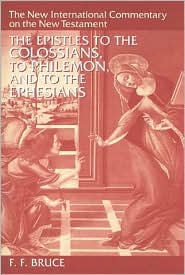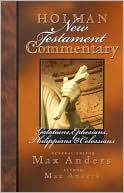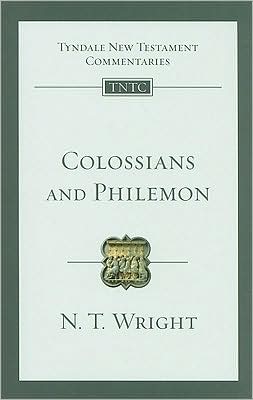Colossians, Philemon
This part of the NIV Application Commentary Series helps readers learn how the message of Colossians and Philemon can have the same powerful impact today that they did when Paul first wrote them.\ \ Most Bible commentaries take us on a one-way trip from the twentieth century to the first century. But they leave us there, assuming that we can somehow make the return journey on our own. In other words, they focus on the original meaning of the passage but don't discuss its contemporary...
Search in google:
This part of the NIV Application Commentary Series helps readers learn how the message of Colossians and Philemon can have the same powerful impact today that they did when Paul first wrote them.
Philemon Colossians\ \ By David E. Garland \ Zondervan\ Copyright © 1998 Zondervan\ All right reserved.\ ISBN: 0-310-48480-4 \ \ \ \ Chapter One\ Colossians 1:1-8 \ * * *\ Paul, an apostle of Christ Jesus by the will of God, and Timothy our brother,\ 2 To the holy and faithful brothers in Christ at Colosse:\ Grace and peace to you from God our Father.\ 3 We always thank God, the Father of our Lord Jesus Christ, when we pray for you, 4 because we have heard of your faith in Christ Jesus and of the love you have for all the saints-5 the faith and love that spring from the hope that is stored up for you in heaven and that you have already heard about in the word of truth, the gospel 6 that has come to you. All over the world this gospel is bearing fruit and growing, just as it has been doing among you since the day you heard it and understood God's grace in all its truth. 7 You learned it from Epaphras, our dear fellow servant, who is a faithful minister of Christ on our behalf, 8 and who also told us of your love in the Spirit.\ Original Meaning\ The first two sections of Paul's letter to the Colossians consist of his customary salutation (1:1-2) and the prayer of thanksgiving that he offers to God on behalf of the believers in the churches (1:3-23). These sections help set the agenda for the rest of the letter.\ The Salutation (1:1-2)\ Paul begins his salutation identifying himself as "an apostle of Christ Jesus by the will of God." He does not write as a private interested party but as Christ's apostle who speaks with authority. By identifying himself in this way Paul is not trying to establish his badge of rank or to put his readers under his thumb. His authority is not increased by the use of the title apostle, just as it is not reduced when he omits it (1 Thess. 1:1; 2 Thess. 1:1) or substitutes "servant" (Phil. 1:1) or "prisoner" (Philem. 1). Being an apostle is simply what he is.\ We therefore should not assume, as some do, that when Paul refers to himself as an apostle, he is defending his calling against bitter opposition. Not everyone to whom Paul wrote was suspicious of his eligibility or adequacy as an apostle, and he was not always on the defensive. He praises the Colossians as a loving, supportive community, not a bickering, backbiting, spiteful group (1:8; Philem. 5). Though many in the Colossian church have not met Paul personally, the letter gives the impression that they esteemed both him and his coworker Epaphras, their evangelist. Paul writes to them because they already accept his authority, which derives from the gospel he has been called to preach, a gospel they have learned from Epaphras.\ When Paul says that his calling as an apostle came "by the will of God," it reflects his basic conviction that Christ called and empowered him to carry on a divine task that was entrusted to only a few. In the Old Testament, God appeared to prophets and sent them forth to proclaim the word. In Paul's case, Christ appeared to him and sent him out to proclaim a particular gospel (Gal. 1:12, 16; 1 Cor. 15:8-10). He did not decide to go into the apostolic ministry but understood himself to have been set apart by God from his mother's womb to carry the gospel to the nations (Gal. 1:15-16). His authority was unique since it derived directly from Christ, but Paul did not see himself as set apart for high office from which he could rule the roost and issue divine directives (see 1 Cor. 4:9). God assigned him a task, not a status.\ As Christ's apostle Paul is not tied to any one congregation but is obligated to all, particularly the Gentiles (Rom. 11:13; Gal. 2:7; Eph. 3:1-2). The world is his mission field. All he does as Christ's apostle involves Christ's church. Therefore, his charge to preach the gospel and build up the body of Christ by helping believers with their struggles in obedience leads him to intervene in the Colossian controversy.\ Paul includes Timothy, "our brother," as a cosender of the letter. Timothy appears as the cosender in five other letters: 2 Corinthians, Philippians, and Philemon, and with Silvanus in 1 and 2 Thessalonians. According to Acts 16:1-2, Paul met this young man during his ministry in Derbe or Lystra. Because Timothy's mother was Jewish, Paul made his status as a Jew official by circumcising him (Acts 16:3). Timothy joined Paul on his missionary travels, and Paul extolled him as a devoted son (1 Cor. 4:17; Phil. 2:22) and trusted him as a faithful emissary, sending him to various churches to help assuage anxious converts or to put out fires of conflict (1 Cor. 4:17; Phil. 2:19; 1 Thess. 3:2, 6). Although Timothy was not an apostle, Paul affirms him as one who carries on the same work (1 Cor. 16:10) and the same preaching task (2 Cor. 1:19).\ We have no record of Timothy's direct connection to the Colossians. Possibly his name appears in the salutation because he composed the letter from Paul's dictation or at his direction. His inclusion also makes clear that what follows is not Paul's peculiar opinion. Paul is no maverick and does not stand alone on these issues. He works with a team of ministers, and this letter reflects the consensus of those who are with him (see 4:10-14).\ Paul greets the church as "holy and faithful brothers in Christ." Holiness has to do with being set apart from the world unto God and does not imply that these believers belong to some exalted echelon of saints. As God has made Paul his own as Christ's apostle, so God has made the Colossians as his covenant people in Colosse. The word "holy" (or "saints") was applied to Israel in the Old Testament, and Paul intentionally includes Gentile Christians under this category. It means that they also belong to the eschatological people for whom all the promises apply.\ Paul customarily identifies the recipients of his letters as "saints," but he does not usually address them as "faithful." This expression most likely refers to their steadfastness under pressure. Some commentators take it to mean exactly the opposite of what it says. They suggest that Paul subtly hauls over the coals those in the church who have been unfaithful by forsaking the true gospel for the so-called "philosophy." This reading assumes that Paul is being disingenuous. His praise becomes a backhanded compliment with a warning: "I am not fully convinced that you are faithful, so you better watch out." Commentators have unduly read the threat from the "philosophy" into every phrase of Colossians. But Paul's statements do not all contain some hidden nuance. If the Colossians were not faithful or were verging on abandoning their faith, Paul is perfectly capable of warning them forthrightly. He does not use "faithful" in Ephesians 1:1 in a reproving way, nor does it have any hidden meaning when he uses it to describe his coworkers Epaphras, Tychicus, and Onesimus (Col. 1:7; 4:7, 9; see also Eph. 6:21).\ We should therefore accept the plain meaning of the text: The Colossians are genuinely "faithful," which is the reason for his thanksgiving. Their faith is not teetering on the brink of extinction, trapped in error, or at the mercy of those hawking false teachings. They are holding fast to the head (2:19), and Paul only warns them about others who do not. Their faith is not perfected, however, and Paul wants to buttress it further and revitalize their growth. In this greeting, he establishes their common commitments so that he can move on to instruct and warn them. His goal is to ensure that they remain securely established in their faith (1:23) and growing in their knowledge (1:10).\ The NIV chooses not to retain the parallelism in the Greek text by translating 1:2, "To the holy and faithful brothers in Christ at Colosse." Literally, the Greek reads: "in Colosse ... in Christ." The parallelism implies that the recipients may reside in Colosse, but more importantly they live in the sphere of Christ. "In Christ" and related phrases appear frequently in Paul's writings, and the concept is central to his understanding of our salvation.\ (1) To be in Christ means to be incorporated in him so that he encompasses the entire life of the believer. The recipients may be Colossians, but the only identity that matters to God is that they are Christians. That means that Christ determines everything in their lives. Paul will later make clear in the letter that his death becomes their death, his burial their burial, his resurrection their resurrection, his victory their victory (2:6-23).\ (2) To be in Christ means that the Colossians are exclusively joined to him and to no other. One cannot be "in Isis," "in Artemis," or in any other god or goddess and also be in Christ.\ (3) To be in Christ means that he determines the behavior of believers. One cannot be "in the world" or "into magic or drugs," for example, and be "in Christ." Elsewhere Paul uses this basic idea to denounce immorality: "Do you not know that your bodies are members of Christ himself? Shall I then take the members of Christ and unite them with a prostitute? Never!" (1 Cor. 6:15).\ (4) To be in Christ means that believers are inseparably joined to him. Paul expresses this powerfully in Romans 8:38-39: "Neither death nor life, neither angels nor demons, neither the present nor the future, nor any powers, neither height nor depth, nor anything else in all creation, will be able to separate us from the love of God that is in Christ Jesus our Lord."\ (5) To be in Christ means that believers are also joined to a new family where the dividing lines that separate and categorize persons have been erased (see Rom. 12:5). Their mutual faith in Christ has created a spiritual kinship that supersedes blood ties.\ Being in Christ gives Christians their true identity beyond their race, nationality, or clan. Paul therefore calls the Colossians "brothers." Jews addressed fellow Jews as brothers (Acts 2:29, 37; 3:17; 7:2, 26; 13:15; Rom. 9:3), but for a devout Jew to call Gentiles brothers, many of whom he has never met, reveals the radical consequences of a gospel that swept away all racial prejudices isolating people from one another (see Col. 3:11; cf. Gal. 3:28; Philem. 16).\ As many have noted, the customary greeting of letters, chairein ("greetings," Acts 15:23; 23:26; James 1:1), is transformed into a promise of "grace" (charis). The letter itself is intended to be a means of grace, and the word reappears in the concluding wish in Colossians 4:18. "Peace" was the traditional greeting in Hebrew (salom). The peace Paul has in view is peace that only God's salvation brings-harmony, wholeness, and serenity. These are things that human force or a balance of terror cannot establish. Paul shows an ardent concern that the effects of this peace from God be obvious in the life of Christian communities. "Peace" becomes a key component of his moral exhortation and appears in his appeal to the Colossians in 3:15.\ Paul confesses that both grace and peace come "from God our Father." The thanksgiving that follows is based on all that God has done and will continue to do (1:7, 12-13). The image of father conveyed power, authority, and loving care. The nearness and love of God as Father was something particularly esteemed by Christians, and Paul usually identifies God as the Father of Jesus Christ, as he does in 1:3. For Christians, God is our Father because he is the Father of Jesus Christ, to whom we belong. The Father is not an impenetrable and invisible God but one who makes himself known through his Son (see Matt. 11:27). Both Father and Son can be known even by those disdained as "babes" by the so-called "wise and learned" (Matt. 11:25).\ The Structure of the Thanksgiving (1:3-23)\ Paul adopted the custom in ancient letter writing of offering a prayer of thanks to the gods and transformed this convention by expanding it and filling it with Christian meaning. His thanksgiving is not some perfunctory nod to various divinities for blessings received and misfortunes averted. It is a prayer to be read aloud in Christian worship and thereby becomes a witness of Christian faith and a means of Christian instruction. Paul never trots out some stock, all-purpose prayer but carefully tailors it to the situation of the church he is addressing. He sensitively weaves together the church's progress in the faith, their needs, and his hopes for them into a beautiful tapestry of praise and thanks to God. One should not ignore the thanksgiving proems in Paul's letters as unimportant devotional meditations unrelated to the key themes of the letter. They lay the groundwork for what follows in the letter, previewing its major themes and setting the tone of the letter.\ The thanksgiving section in Colossians extends from 1:3 through 1:23 and includes the Christological prose hymn in 1:15-20. The key ideas of "faith," "hope," and "hearing" in the opening (1:4-6) are repeated in 1:23 to form an inclusio-a rhetorical device in which the beginning of a unit is repeated in its ending. The thanksgiving divides into two parts, 1:3-8 and 1:9-23. The first part focuses on the effects of the gospel in Colosse and the whole world, the second on Paul's intercession for the Colossians and his celebration of the salvation accomplished by Christ.\ In 1:3-5, Paul tells the Colossians that he always thanks God for them because of their faith in Jesus Christ and their love for all the saints. The focus on the community suddenly shifts in 1:6 to the whole world as he exults over the universal effects of the gospel. In 1:7-8 he returns to how the gospel took root in Colosse through Epaphras's ministry. This first section of the thanksgiving forms a chiasm, a literary pattern in which two or more terms, phrases, or ideas are stated and then repeated in reverse order (ab ba):\ A v. 4: We have heard of your faith in Christ Jesus and of the love you have for all the saints\ B v. 5: the faith and love that spring from the hope stored up for you in heaven and that you have already heard about in the word of truth, the gospel\ C v. 6a: that has come to you. All over the world this gospel is bearing fruit and growing,\ B' v. 6b: just as it has been doing among you since the day you heard it and understood God's grace in all its truth.\ A' vv. 7-8: You learned it from Epaphras, our dear fellow servant, who is a faithful minister of Christ on our behalf, and who also told us of your love in the Spirit.\ From this structure we see that the heart of the first part of the prayer is verse 6a, in which Paul gives thanks for how the gospel has spread throughout the world.\ The second section of the thanksgiving consists of Paul's intercession for the Colossians (1:9-14). Paul restates that he does not cease praying for them (1:9; cf. 1:3), and in 1:9-11 he reiterates in reverse order the key phrases in 1:3-6.\ \ Continues...\ \ \ \ Excerpted from Philemon Colossians by David E. Garland Copyright © 1998 by Zondervan. Excerpted by permission.\ All rights reserved. No part of this excerpt may be reproduced or reprinted without permission in writing from the publisher.\ Excerpts are provided by Dial-A-Book Inc. solely for the personal use of visitors to this web site. \ \
Series Introduction7General Editor's Preface11Author's Preface13Abbreviations15Introduction to Colossians17Outline of Colossians34Selected Bibliography on Colossians36Text and Commentary on Colossians39Introduction to Philemon293Outline of Philemon313Selected Bibliography on Philemon314Text and Commentary on Philemon315Scripture Index377Subject Index387

